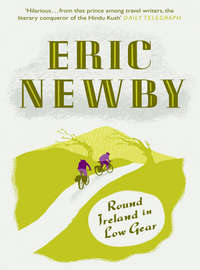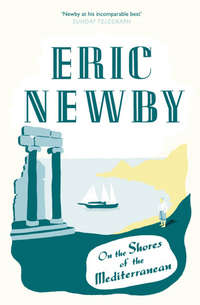
Полная версия
Love and War in the Apennines
After about a mile, the lane suddenly came to an end and we found ourselves in the workshop area of the airfield, among buildings with bright lights burning in them. One of them had a number of large wooden crates standing outside it, some of which had only recently been broken open. They contained aircraft engines. On as many of these as we dared expend them we stuck a bomb. It was a terrible waste of explosive; but if we failed on the airfield itself we wanted to leave something to be remembered by. Perhaps, unconsciously, in destroying the engines we were performing some primitive ritual of atonement.
We were now very close to the edge of the airfield and we were just about to split up into pairs and set off for our various targets, Butler’s and my own being the bombers on the far side of it, more than half a mile away, when we ran straight into a body of men, one of whom shouted at us in Italian, demanding to know who we were. We said nothing but pressed on through them until the same man shouted at us again, this time more insistently – what sounded to me like ‘Eh! Eh! Eh!’ – so insistently that George was forced to reply, using one of the phrases which we had all memorised, ‘Camerati Tedeschi’, which we had been told meant ‘German Comrades’.
It sounded even less convincing now, on enemy soil, coming from the mouth of a captain in the Black Watch who had been a sheep farmer in Dumfriesshire before the war, than it had when we had all practised it, and other Italian and German phrases, on one another in the submarine. And it must have sounded even more so to the Italian because he immediately took a pot shot at us with some sort of firearm. Fortunately it was not an automatic weapon, or perhaps it was on single rounds. If it had been he would probably have rubbed us out completely. Whatever it was, he only fired a single shot.
Then one of our party, I never knew who it was, fired back, a single round from a machine pistol.
The effect of the two shots was positively magical. Immediately the airfield was brightly lit by searchlights which were disposed around the perimeter – as if the man who had fired at us had his hand on the switches – and then pandemonium broke loose: lorries and trucks started up; Verey lights rose; the air was filled with the ghastly sounds of commands being issued in Italian and German; and there was the, to me, equally terrifying noise made by men in boots running on hard surfaces in step. It was difficult to repress the thought that we were expected.
I was not surprised. What had surprised me, had surprised us all, was that we had managed to land at all. This kind of operation had been successfully attempted so many times in the past and with such losses in aircraft to the enemy, that by now it was inconceivable that they would not be permanently on the qui vive, and on the very eve of a major action, doubly so. Probably the only reason we had got this far unchallenged was because not even the Germans could imagine that the sort of small party that had done such damage on their airfields in the past would be crazy enough to make a frontal assault on a target of this magnitude. We were lucky to have got over the wall into the farmyard. In this way we seemed to have avoided the official way in.
There were men all round us now but they were confused as to who was who, and afraid to open fire for fear of killing some of their own side. Fortunately the workshop area was one of the few parts of the place which were still comparatively dark, because it was masked by the buildings.
It was at this moment, with everyone milling around in the darkness as if they were playing Murder at a party, that a man loomed up in front of me speaking excitedly in German. There seemed no alternative but to shoot him before he shot me and I stuck my pistol hard against his ribs and was just about to press the trigger when he said in Lowland Scots ‘Don’t shoot you stupid bastard. It’s me!’
Then we dodged round the corner of one of the buildings and ran as hard as we could across a piece of brilliantly illuminated ground on which some clumps of bushes partly hid us from view, towards a wood, a hundred yards or so away.
As soon as we reached it we lay down and tried to make out what was happening. There was no need to use night glasses. With half a dozen searchlights playing on it, the airfield looked more or less as it must have done under the midday sun, except that now it was swarming with infantry who were being formed up to carry out a large-scale battue, and every moment more lorry loads were arriving. I felt like a pheasant looking out on the approaching beaters from the false security of a covert. Surprisingly, there seemed to be no guard dogs. I had expected the place to be seething with them, as some of the Cretan airfields had been, according to those who had visited them.
And beyond the soldiers were the planes. I had never seen so many J.U.88s in my life.
‘What I think we should do,’ George said, ‘is …’
‘Fuck off,’ said a readily identifiable voice which was not that of an officer. ‘That’s what we ought to do, fuck off, while there’s still time.’
The suggestion was so eminently sensible, and the person who made it so experienced in these matters, that it only remained to put it into practice. The operation was off for anyone who was not trying for a posthumous award of the Victoria Cross, and there would be no one left alive to write the citation if he was. There was now not a hope of crossing the airfield and reaching the planes, and even if one succeeded there would still be the guards to deal with. The thing to do now was to get out before we were cut off from the beach.
We moved back through the wood which was all lit up and reminded me vividly of Act Two, Scene One of As You Like It, the Forest of Arden in the Open Air Theatre in Regent’s Park, until we came to an expanse of open heath in the middle of which stood a tall electric pylon, one of a long line which stretched away in the direction of Catania – strange things to find close to an airfield where one would have thought that they would have been a serious obstacle to flying; and we stuck a couple of bombs on it and piled the rest at the foot of it and set them going too. It was a puerile thing to do. The pylon would certainly be repaired in a couple of days.
It was now eleven-twenty. To get back to where we had started from we had to travel on a diagonal course across country, roughly south-east, and we set off very fast in single file until we reached a wood filled with dead and dying trees which had fallen across one another and dry branches which made a shattering noise when they broke underfoot. Beyond the wood there were some fields planted with lines of vines supported by wires at right angles to the direction in which we were travelling and beyond them there was a swamp with thousands of frogs croaking madly in it and in this we floundered miserably, and beyond the swamp were the dunes. It was midnight. Just as we reached the dunes we heard the sound of an approaching aircraft and immediately all the lights on the airfield went out and so did those to the north in Catania, sirens wailed and flak began to rise lazily in the air from around the perimeter. This was a solitary Wellington gallantly coming in to drop its bombs and create a diversion in order to help us, although what purpose this diversion was to serve when no one except ourselves could know where we would be at this particular time, or what stage the operation would have reached, had not been clear to any of us; but whether we liked it or not there had been no one on Malta who had known how to stop the diversion happening. It was something out of Kafka, immutable.
Our feelings were expressed by the man who said that we ought to fuck off.
‘If they can send one Wellington to bomb the bloody airfield why not send six, knock shit out of it, even if they only get the runways, and save us getting our feet wet.’
But although we were unappreciative, the arrival of the Wellington was very opportune and it coincided with the explosion of our own first lot of bombs which we had planted in the crates outside the workshops.
We were in among the coastal batteries now. It was a place in which to move warily. If you fell into one of the trenches which linked them you could easily break your neck. Fortunately they were deserted. Everyone was in the casemates and in spite of the din of the air raid we could hear the mumbling and rumbling of conversation inside. The occupants were the coastal gunners, and probably the infantry as well, who should have been manning the trenches and machine-gun emplacements; all of them prudently keeping their heads down.
It was here, among the trenches that we lost Sergeant Dunbar who had been bringing up the rear of the retreat. One moment he was with us, the next he was gone and it was not until some days later that we found out what had happened to him. He had trodden on what he thought was terra firma, but was really nothing but a camouflaged groundsheet which a number of Italian soldiers had erected over an open strongpoint so that they could play cards without showing a light (not all of them had taken refuge under concrete) and he had fallen through it on to their makeshift table and in the ensuing struggle had been wounded and overpowered. It was lucky for the rest of us that there seemed to be no communication between the defenders of the airfield and those on the coast who did not appear to have been alerted to what was going on at all.
By the time we reached the wire the Wellington had droned away and it had begun to rain. There was no time to waste if we were to get back to the submarine before it submerged, which it was due to do in just over three-quarters of an hour. But while we were trapped in the middle of the entanglement we saw a party of men walking along the beach on the seaward side of it and they saw us, too.
There were about a dozen of them and it was obvious that they had seen us, because when they were opposite us they stopped and, literally, put their heads together. The effect was both alarming and comical. We must have had the same effect on them, frozen in the attitudes in which they had discovered us, most of us hooked on the wire, some of us, although they could not see this, with the rings of Mill’s grenades between our teeth, wondering whether to pull the pins and chuck them, or wait and see what happened. (How I prayed that the hothead who had returned the fire of the Italian outside the workshops would not do this. If he did we would never get off alive.) But they must have been as reluctant as we were to start any trouble, because, after what seemed an eternity, they turned round and went off southwards along the shore in the direction from which they had come, and no doubt they reported that they had seen nothing out of the ordinary in the course of what was probably a routine patrol. Both parties had had a very lucky escape.
Our route back to the beach had been so roundabout that when we finally emerged from the wire on the foreshore we were not sure whether the place where we had buried the canoes was to the north or south of us. I wondered why, if we had been travelling roughly south-east, as we all thought we had, we had not crossed the dark lane from the farm to the airfield or, failing that, had not seen the sunken field with the horse in it if the boats were now to the north of us. But as we were all reluctant to go in the same direction as the enemy, even an enemy as pusillanimous as they had been, we turned left, which was north, walking in the sea, so that we should be less visible from the blockhouses. And while we were splashing along the edge of the surf which was heavier now, the wind having freshened, there was a succession of glares and heavy thuds inland as the pylon charges and those in the haversacks, perhaps the whole lot of them, went up. It was now twelve-thirty on the morning of the twelfth. At home in a few hours, as George reminded us, grouse shooting would be beginning.
Luckily we were heading in the right direction and soon we found the canoes, or rather the place where we had cut the wire. It was fortunate that we had met the patrol where we did, otherwise they would have gone on and seen the hole in the wire and this would have been something that they could not possibly have ignored. They were going to have some difficulty in explaining why they hadn’t seen it, anyway.
Now we dug up the canoes. What had been George’s and Sergeant Dunbar’s was in such bad shape, having been smashed against the side of the submarine while it was being launched, that we decided to abandon it and after we had punctured the flotation bags and had made an unsuccessful attempt to sink it, I took George into my canoe. We were now three men to a two-man canoe and we had some difficulty in getting into it once we were through the surf and when we did there was very little freeboard.
It was now a quarter to one and there were only fifteen minutes left before Una was due to submerge. We paddled the two canoes off on the back bearing, occasionally flashing a hooded torch which was a terribly risky thing to do and might have imperilled the submarine if there had been a patrol boat offshore; but we could think of nothing now beyond being picked up and saving our skins.
But we were not picked up. By the following year a homing device had been produced which was used successfully in the Far East and with which we would have been able to find her. As it was, in the rain and darkness, we never saw her. We must have gone out and beyond her, probably passing quite close, and then the north-east wind and the tidal stream, which was setting southwest, must have taken us down to leeward of her.
By three in the morning there was a nasty sea running and shortly afterwards my canoe filled with water and we had to abandon it; and although we tried to get the flotation bags out of the bow and stern, which would have been a great help in keeping us afloat, we were not able to do so. The other canoe, with Desmond and Duffy in it, was not in much better condition, and if any of us had tried to hold on to it in such weather it would have gone too.
It was very dark, the water was surprisingly cold and I was very frightened, more frightened than I had ever been. What upset me more than anything, quite irrationally, was the thought that if we drowned – which seemed more than probable – none of our people would ever know what had happened to us and why.
I had just succeeded in getting my boots off when I saw George swimming away into the darkness, and I knew immediately that he was doing so because he felt that he could not keep afloat much longer and did not want to be a burden to the rest of us. He was not a strong swimmer and he had no spare flesh on him to combat the cold.
I was the only one who saw this and I went after him and persuaded him to come back, after a fantastic conversation in the sea of which I shall never forget the gist but have completely forgotten the actual words which passed between us; all I can remember was that he was very calm and determined, just as Captain Oates must have been, walking out of that tent in the Antarctic; but eventually he swam back with me and Desmond insisted on getting out of his canoe and giving George his place, which was difficult to do but undoubtedly saved George’s life.
Now we tried to swim shorewards to where we thought the mouth of the Simetto River ought to be. If we could only reach the right bank before dawn we might be able to lie up among the trees until nightfall and then make the rendezvous for the second night with the submarine, by Capo Campolato, six miles to the south. But although by first light the wind died away, we never reached the mouth of the river or the rendezvous. It was a pity because, at great risk, Pat brought Una back three nights running to wait for us although he and his crew having seen the explosions on the airfield and heard the shooting, were more or less convinced that we were captured or dead.
Of the fourteen merchant ships which took part in Operation Pedestal, five reached Malta, including the tanker Ohio, which was enough to save it. The remaining nine were all sunk, at least four of them by J.U.88s operating from Sicily on August the twelfth and thirteenth. Operation Whynot is not one on which I look back with either pride or pleasure. The fishermen took us in to Catania where we were surrounded by a hastily assembled escort, and marched, presumably for the edification of the inhabitants, bootless and in the few clothes which remained to us – some of us were without trousers – up past palaces and convents, some of them like those on Malta and equally golden in the sunshine, to a more modern building in the centre of the city. Here we were subjected to a long, inexpert interrogation by unpleasant men in civilian clothes. We were still very sure of ourselves and Desmond made the kind of rude remarks about the Duce, whose photograph glowered down at us from the wall, which only Guards officers are really capable of making, and to such an extent that we were in danger of being badly beaten up, as we certainly would have been if we had been Italian prisoners insulting a portrait of Churchill.
The Italians were angry enough without being taunted. We had penetrated their coast defences and the Germans, whose aircraft had been in some danger, had already pointed this out to them. That we had failed completely to do what we had set out to do did nothing to appease them. It was now that we made a rather feeble attempt to escape from the window of a lavatory to which the guards had, rather stupidly, taken us en masse. What we would have all done in the middle of Catania with hardly any clothes on, none of us had stopped to think; we were too bemused.
We were given nothing to eat or drink, and all that morning we sat shivering in our damp underwear and shirts in a northfacing room; and George, who had not recovered from his immersion, became ill. Finally an Italian colonel arrived and cursed our hosts for keeping us in such a condition and we were issued with cotton trousers and shirts and cotton socks and canvas boots made from old rucksacks, which were very comfortable, and we were also given food. Later in the afternoon we were put in a lorry and taken to a fort with a moat round it in which the conducting officer told us, we were to be shot at dawn the following morning as saboteurs because we had not been wearing any sort of recognisable uniform when we were captured. Looking out of the window into the dry moat in which the firing party was going to operate, I remembered the innumerable books about first war spies that I had read at school which invariably ended with ghastly descriptions of their executions. Mostly they were cowardly spies whose legs gave way under them, so that they had to be carried, shrieking, to the place of execution and tied to stakes to prevent them sinking to the ground, and although I hoped that I wouldn’t be like this, I wondered if I would be.
By this time George was very ill. He had a high temperature and lay on one of the grubby cots, semi-delirious. We hammered on the door and shouted to the sentries to bring a doctor, but of course none came.
Finally, sometime in the middle of the night (our watches had been taken away from us so we no longer knew what time it was), a young priest arrived, escorted by two soldiers, as we imagined to prepare us for the ordeal ahead; but, instead, he dismissed the sentries and knelt down by the side of George’s bed and prayed for him.
The priest spoke a little English and before he left he told us that the Germans were even more angry about the Italians’ decision to execute us without consulting them first, than they had been about the attack on the airfield, and that they had given orders that we were on no account to be shot but sent to Rome at once for further interrogation. Perhaps they never meant to shoot us but, all the same, we thought ourselves lucky.
The next day George was better, although still very weak, and later that day we left for Rome by train with a heavy escort of infantry under the command of an elderly maggiore who had with him an insufferably conceited and bloodthirsty sotto-tenente who had obviously been recently commissioned.
By now we were all very depressed but Desmond, who had a positively royal eye for the minutiae of military dress, had the pleasure of pointing out to the sotto-tenente that he had his spurs on the wrong feet.
‘He is quite right,’ said the maggiore who was not enjoying his escort duty and appeared to dislike the sotto-tenente as much as we did. ‘Go, instantly and change them. You are a disgrace to your regiment.’
At Rome station while being marched down the platform to the exit, we were able to pick up some of the ruinous and extensive baggage belonging to some very pretty peasant girls who had travelled up from the south on the same train. Happy to be given this assistance, for there were no porters even if they had known how to hire one, they trotted up the platform beside us between the escorting lines of soldiers who had been given orders only to shoot or bayonet us if we tried to escape, with the residue of their possessions balanced on their noddles, while the sotto-tenente screeched at us to put their bags down and the maggiore, not wishing to make an exhibition of himself, disembarked from the carriage in a leisurely fashion. These were the last girls any of us spoke to for a long time.
In the city we were housed in barracks occupied by the Cavalleria di Genova, a regiment in Italy of similar status at that time to one or other of the regiments of the Household Cavalry in Britain. They still had their horses and the few officers and men who were about looked like ardent royalists. They certainly all knew about which was the right boot for the right spur, which was more than I did and, although they were not allowed to speak to us, their demeanour was friendly. They sent us magazines and newspapers and the food, which was provided by the officers’ mess and brought to us by a white-jacketed mess waiter who had the air of a family retainer, was of an excellence to which none of us were accustomed in our own regiments, although there was not much of it.
After the first day we were all separated from one another and we began a period of unarduous solitary confinement in the course of which we contrived to communicate with one another by way of the mess waiter who carried our innocuous written messages from one room to another among the dishes. At intervals we were all interrogated, but never really expertly, by people from military intelligence. As we had been taught never to answer any questions whatsoever, however fatuous they might seem, we learned more from our interrogators than they did from us. It was interesting to find out how much they knew about our organisation. About some parts of it they knew more than I imagined they would; about others they seemed to know much less.
Once a day, but never together, we were let out to exercise on the pathway which surrounded the manège. Here ‘by chance’, we met other ‘prisoners’, an extraordinarily sleazy collection of renegades and traitors, most of them South African or Irish, dressed in various British uniforms, some in civilian clothes, who called us ‘old boy’ and offered to fix us up with nights on the town and escape routes into the Vatican in exchange for information.
I enjoyed being alone. It was so long since I had been. From my room, high up under the eaves of the barracks, I used to watch a solitary, elegant officer taking a succession of chargers around the tan. He was a wonderful horseman, even I could tell this without knowing anything about horses. The days were poignantly beautiful. The leaves on the plane trees were golden. Here, in Rome, in late August, it was already autumn. I was nearly twenty-three and this was my first visit to Europe. Locked up, isolated in the centre of the city, I felt like the traitor Baillie-Stewart, ‘the Officer in the Tower’, or, even less romantically, someone awaiting court martial for conduct scandalous and unbecoming, looking out across the Park in the years before the war.









